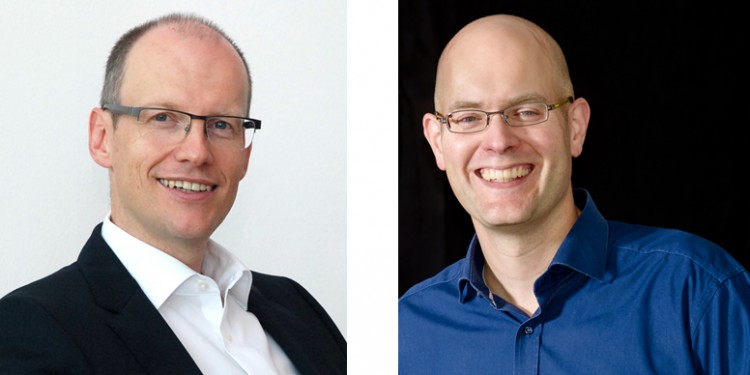
"ERC Advanced Grants” for Ralf Adams and Frank Glorius
Two “Advanced Grants” for 2018 from the European Research Council (ERC) go to researchers at the University of Münster and the Max Planck Institute (MPI) for Molecular Biomedicine in Münster. Biochemist Dr. Ralf Adams, Professor at the Medical Faculty of the University and at MPI, and chemist Dr. Frank Glorius, Professor at the Institute of Organic Chemistry at the University, each receive one of the grants, which together total around 4.7 million euros. ERC funding provides a financial basis for research projects, and at the same time they are seen as recognition of outstanding research work. This is what makes the ERC Grants so coveted.
Prof. Ralf Adams is head of the department “Tissue Biology and Morphogenesis” at the Max Planck Institute for Molecular Biomedicine in Münster, as well as being a researcher at the “Cells in Motion” Cluster of Excellence at Münster University. His department undertakes research into the growth and organotypic specialisation of blood vessels. The most recent work done by Ralf Adams and his team has provided fundamental insights into the organisation of the bone vasculature system in mice. What the team is researching into includes the changes which occur during the ageing process and functional specialisations in the minute bone vasculature and endothelial cells which coat the blood vessels. What the researchers are particularly interested in are the molecular signalling pathways which steer these processes. They have shown, for example, that the manipulation of such steering processes in endothelial cells in an ageing animal can trigger the growth of so-called osteoprogenitor cells. These special cells are involved in bone formation. What the researchers now want to examine in the project to be funded by the ERC is whether – and, if so, to what extent – this mechanism can be used in future to help patients with osteoporosis. For Ralf Adams this is the second Advanced Grant. He already received research funding of this nature in 2013.
Prof. Frank Glorius holds a chair at the Institute of Organic Chemistry at Münster University. His international research group is developing new catalysis concepts and studying their application. Modern catalysis makes it possible to produce chemical compounds in an eco-friendly and cost-efficient way. The range of fields the team is working in includes not only the biomimetic use of organic molecules as catalysts, but also research into soluble metal complexes, and the development of solid metal catalysts, whose properties are systematically influenced using organic molecules on the surface of the metal. The team is seen as one of the international leaders in these fields. Frank Glorius also undertakes research in what is considered to be the difficult area of the hydration of aromatic molecules. The aim is the selective conversion of easily available planar molecules (aromatics) into valuable, saturated molecules with a variety of structures, as occur in natural materials and active substances in medicine. One problem is the high reaction inertia shown by aromatics with, at the same time, the sensitivity of the functional groups appended. The aim the researchers have, therefore, is to develop powerful catalyst systems which facilitate the conversion desired, but also leave sensitive functional groups intact. With the aid of this Advanced Grant, Frank Glorius’ team can now extend its research. After receiving an ERC Consolidator Grant in 2010, this is the second ERC Grant for Frank Glorius.
The “Advanced Grants” funding line is directed at established researchers with an outstanding scientific track record in the last ten years. Other funding lines include, for example, ERC Starting Grants and ERC Consolidator Grants. Altogether, there are around 20 researchers at Münster University who have received at least one grant from the EU Commission in the course of their career.
Information on the two researchers:
Ralf Adams
Ralf Heinrich Adams completed his PhD at the Max Planck Institute of Brain Research in Frankfurt am Main and at the University of Frankfurt. After receiving his doctorate in 1995, he did research at the European Molecular Biology Laboratory in Heidelberg. In 2000 he moved to London to take up a position as team leader at Cancer Research UK. In 2007 he was appointed professor at the Faculty of Medicine of Münster University. Since 2007 he has also been a Director at the Max Planck Institute for Molecular Biomedicine in Münster. Ralf Adams is one of the leading researchers at the “Cells in Motion" (CiM) Cluster of Excellence at the University of Münster.
Frank Glorius
Frank Glorius gained his PhD in 2000 at the University of Basle. After posts at the University of Harvard (USA), at the Max Planck Institute in Mülheim an der Ruhr, and as a professor at Marburg University, he then moved to the University of Münster where, since 2007, he has been working at the Institute of Organic Chemistry. Among the many distinctions he has received are the Gottfried Wilhelm Leibnitz Prize awarded by the German Research Foundation (2013) and the Arthur C. Cope Scholar Award presented by the American Chemical Society (2018). He has frequently been one of the “Highly Cited Researchers” – a list of the most influential scientific minds. This list is drawn up regularly by Clarivate Analytics (formerly Thomson Reuters), which runs the “Web of Science” database for literature and citations.
